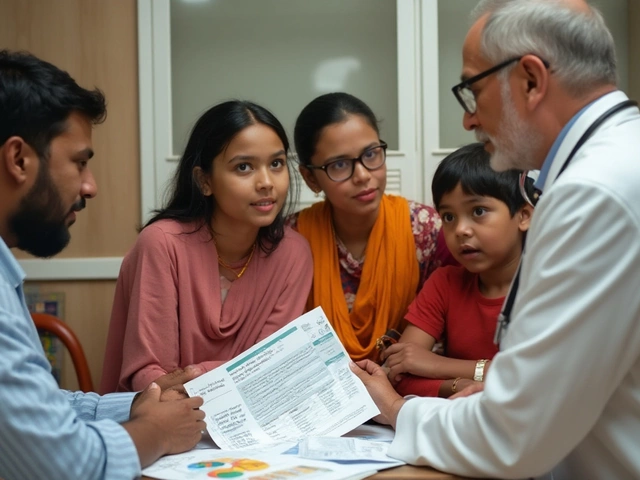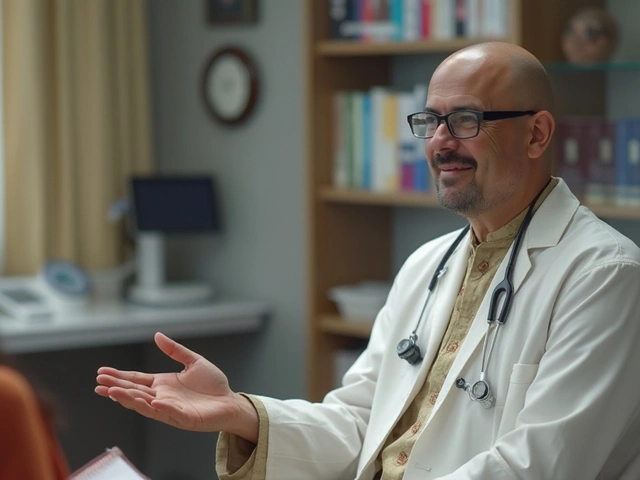
The question of whether cancer can be completely beaten is one that sparks both hope and curiosity. As one of the leading causes of death globally, cancer is a formidable foe, posing unique challenges across different types and stages.
Yet, the realm of cancer treatment is far from stagnant. The medical community continues to make incredible strides in understanding this complex disease. With each breakthrough comes potential new pathways to a resolution, prompting the world to reconsider what it means to 'cure' cancer.
In this exploration, we dive into the multifaceted battle against cancer, considering the impact of scientific advancements alongside human resilience. From transformative therapy approaches to compelling survival narratives, every piece of the puzzle plays a vital role in edging closer to our collective goal. So, what does the future hold in this fight, and can we envision a day where cancer is a conquerable foe?
- Understanding Cancer and Its Challenges
- Breakthroughs in Cancer Research
- Current Cancer Treatment Options
- Personal Stories of Triumph
- Preventive Measures and Lifestyle Changes
Understanding Cancer and Its Challenges
Cancer is not a single entity; it is a collective term for more than a hundred distinct diseases that all have one thing in common: the uncontrolled growth and spread of abnormal cells. The human body is designed to grow cells, replicate them, and then naturally eliminate the ones it no longer needs. Cancer disrupts this harmony, causing cells to diverge from their intended path. Recognizing the complexity of cancer treatment starts with understanding these diverse and unpredictable patterns of growth. Scientists have identified various genetic mutations that often lead to this chaos, each presenting its own treatment challenges.
One intriguing aspect of cancer is its ability to adapt and resist even the most potent therapies. Cancer cells can evolve rapidly, which is why treatments that initially seem successful can suddenly lose effectiveness. The intricate relationship between our body’s immune system and cancer adds another layer of complexity. Often, the immune system is tricked into ignoring cancer cells or is simply overpowered. Researchers face an ongoing challenge to develop therapies that target these cunningly adaptive cells while strengthening the body's natural defenses.
Understanding the adversities in beating cancer also involves recognizing the role of lifestyle, environment, and heredity. Studies have shown that factors such as smoking, diet, and exposure to carcinogens can significantly elevate the risk. Genetic predisposition plays a crucial role, with some individuals more vulnerable due to inherited genetic mutations. As Dr. Siddhartha Mukherjee, renowned oncologist, states in his book
"Cancer is a deeply personal disease, and every case is unique. To tackle it effectively, we must appreciate its individuality."His words remind us that both science and empathy are vital in the fight against this multifaceted disease.
Despite the challenges, there are glimmers of hope as breakthroughs in cancer research emerge. Innovations in technology now allow for precise genetic profiling, enabling personalized treatments tailored to individual types of cancer. This personalized approach demonstrates potential in offering effective solutions where traditional methods have struggled. While much remains to be discovered, the dedication and resilience of the scientific community bring us steps closer to transforming the narrative around cancer.
The road to curing cancer is undeniably challenging, but it is also filled with determination and collaboration across continents. The ongoing battle inspires a deeper understanding of not only cancer itself but the potential of human ingenuity. As we continue to support research and awareness, the vision of a future where we might achieve a complete cancer cure becomes less of a distant dream and more of a plausible reality.
Breakthroughs in Cancer Research
Significant breakthroughs in cancer research continue to fuel hope and excitement in the quest to defeat this pervasive disease. Over the past decade, the field has made substantial strides in understanding genetic alterations and mutations that drive the uncontrolled growth of cancer cells. The advent of personalized medicine is one such breakthrough, transforming the standard one-size-fits-all approach. By utilizing genetic profiling and targeted therapy, doctors can customize treatment plans for individual patients based on their unique genetic makeup, thereby improving chances of success and minimizing severe side effects.
One groundbreaking area of research is immunotherapy, which harnesses the body's own immune system to fight against cancer. Scientists have made headway in developing monoclonal antibodies, checkpoint inhibitors, and cancer vaccines, all of which are redefining the landscape of treatment options. A notable success story in this area includes the development of drugs like pembrolizumab, showing promising results in treating various cancers, including melanoma and lung cancer. According to Dr. James Allison, winner of the Nobel Prize in Physiology or Medicine, "Immunotherapy is unlike any other cancer treatment we have. It aims to cross that line from theory to deep understanding of the mechanisms by which we can turn the immune system against cancer."
Moreover, research into CAR T-cell therapy has provided fresh avenues of hope for patients with blood cancers. This innovative treatment modifies a patient's T-cells to target and kill cancer cells more effectively. Breakthroughs in this area offer new lifelines for those with previously untreatable or relapsed conditions. For researchers, the challenge remains to expand the scope of CAR T-cell therapy beyond hematological malignancies to solid tumors. Ongoing clinical trials hold the promise of unlocking next-generation solutions for a broader range of cancers, potentially bringing us closer to achieving a definitive cure.
Investigators are also exploring the role of precision oncology, emphasizing the identification of biomarkers that can predict how a patient might respond to a particular drug. This approach helps to ensure that treatment regimens are more effective and reduces the risk of adverse reactions. Tools like CRISPR gene editing are being leveraged to pinpoint the genetic mutations that cause cells to become cancerous, enabling researchers to develop better-targeted therapies. These advances herald a seismic shift in how cancer treatment is approached, paving the way for innovative therapies that could achieve unprecedented success rates.
A look at the data underscores the impact of these innovations. The five-year survival rate for cancer patients has steadily increased over the past two decades, thanks largely to early detection and the introduction of novel therapies. The continuous flow of data aiding researchers in identifying patterns and outcomes accelerates the pace of discovery. Committed efforts from scientists, healthcare professionals, and patients alike contribute to this ongoing effort, each playing a crucial role in rewriting the story of cancer on a global scale.

Current Cancer Treatment Options
Delving into the labyrinth of cancer treatment can seem daunting, with myriad options designed to target the diverse ways cancer manifests itself. The goal of these treatments often varies depending on the type, location, and stage of the cancer, tailored to either eliminate the disease entirely, control its spread, or alleviate symptoms to improve quality of life. Among the most traditional methods is chemotherapy, a treatment that uses powerful drugs to kill rapidly dividing cancer cells. Although effective, the non-selective nature means it can also damage healthy cells, leading to a range of side effects such as fatigue, nausea, and hair loss. Yet, the relentless quest to refine chemotherapy drugs has led to formulations that are more targeted, lowering their impact on the body's healthy tissues.
An exciting frontier in cancer care is immunotherapy. This groundbreaking approach enhances the body's own immune system to recognize and combat cancer cells. Unlike chemotherapy, which directly attacks the cells, immunotherapy equips the immune system with tools to identify and destroy cancer at its root. Drugs like checkpoint inhibitors have gained traction, especially for their success in treating cancers that were once considered untreatable. The underlying principle is not as recent as its clinical application has become – the notion of immune activation dates back to the late 19th century, but only now is the technology enabling widespread use. It’s worth noting how immunotherapy continues to expand the horizons of what's possible in cancer treatment, offering new hope and avenues even for those who previously felt they had exhausted their possibilities.
Then there's the highly precise world of targeted therapy. This treatment strategy zeroes in on specific genes or proteins that contribute to cancer's growth and survival. While similar to immunotherapy in its precision, targeted therapy distinguishes itself through its focus on molecular differences that are unique to individual cancers. Drugs used in this approach are designed to interfere with specific molecules required for the tumor's growth, potentially heralding fewer side effects and better outcomes. Advances have allowed researchers to sequence entire genomes, offering personalized treatment plans based on an individual’s specific genetic mutation.
Finally, a classic yet crucial method in the cancer armamentarium is radiation therapy. Utilizing high doses of radiation, this treatment method targets tumors to destroy cancer cells. It's often used in combination with other treatments, whether to shrink a tumor pre-operatively or to eliminate residual cancer cells post-surgery. Recent innovations include techniques like proton therapy, which can distribute radiation more precisely to minimize damage to surrounding healthy tissue. A constant theme in cancer treatment is the depth of research aimed at honing these technologies for minimized side effects and maximum efficacy. The landscape is ever-evolving, evidenced by "an estimated 1.8 million new cases diagnosed in 2020 alone, highlighting the critical importance of these therapies," as noted by the American Cancer Society.
The diversity in cancer treatment today showcases the determination and dedication of the medical community towards understanding and overcoming this multifaceted disease. With continued research and patient-centric advancements, the hope is not just to manage cancer but defeat it with ever-increasing accuracy and precision.
Personal Stories of Triumph
In the mosaic of cancer battles, personal stories of triumph serve to inspire and energize those who are navigating similar struggles. These narratives not only offer hope but also spotlight the human spirit's resilience and indomitable will to survive. One such story is that of James Allison, whose victory over cancer is more than personal; it has impacted millions around the globe. James, known for his research into T-cell regulation, was awarded the Nobel Prize in Physiology or Medicine in 2018 for his discovery of cancer therapy through the inhibition of negative immune regulation. His breakthroughs opened new doors for cancer treatment, providing patients renewed optimism and possibilities.
Let's also reflect on Jessica Oldwyn, a woman whose journey through brain cancer was documented in "My Last Days," a docu-series that touched hearts worldwide. Jessica's journey from diagnosis to living robustly, defying odds with a steady blend of humor, strength, and vulnerability, offers a beacon of hope. Her story underscores the impact of mindset, community support, and active involvement in one's health journey. She transformed her experience into a platform for advocacy, raising awareness about cancer treatment and the importance of mental health support during such battles.
"It's not the strength of the body, but the strength of the spirit," Jessica once said, exemplifying the intangible forces that fuel so many in their fight against this disease. Her triumph is not just survival, but the rich and unrelenting pursuit of life, well beyond the limits often prescribed by her condition.
Furthermore, we have the case of immunotherapy pioneer, Roxanne Snider, who took part in a clinical trial that was developing cutting-edge personalized vaccines. Before starting, Roxanne had exhausted several conventional options with little success. Through this innovative treatment approach, she experienced dramatic tumor shrinkage, which lent credence to the potential of personalized medicine in the cancer treatment arena. The data collected from these trials also showed promise, with a substantial percentage of participants witnessing significant health improvements.
These stories, rich with intrepid challenge and discovery, do more than share a light at the end of what can feel like a dark tunnel. They remind us that in every lab, every ward, and every home touched by cancer, there lies potential. Potential not merely for survival, but for redefining what survival looks like. They highlight that triumph often takes various shapes: be it the discovery of a groundbreaking treatment or the unyielding resolve to share joy in the face of adversity. Each story weaves into the complex tapestry of human courage, showing that as we advance in medical science, our most powerful tool remains the enduring human spirit.

Preventive Measures and Lifestyle Changes
Embarking on a journey toward a cancer-free life means embracing preventive measures and lifestyle changes that reduce risk. The key to potentially beating cancer often lies in proactive lifestyle choices. As research advances, there's increasing clarity on effective ways to lower one's chances of being diagnosed with this multifaceted disease. While no method guarantees absolute prevention, certain actions significantly bolster our defenses.
One of the most influential modifications involves diet. Adopting a nutrition plan rich in vegetables, fruits, and whole grains while low in processed foods can arm the body against the onset of cancer. Colorful produce like berries and leafy greens are hailed for their antioxidants, which shield cells from damage. A diet high in fiber, from sources like beans and whole grains, further regulates digestion and reduces the risk of certain cancers.
Exercise plays an equally crucial role in cancer prevention. Regular physical activity helps maintain a healthy weight, which is a significant factor in reducing the risk of various cancers, including breast and colon. Strive for at least 150 minutes of moderate aerobic activity, like brisk walking, or 75 minutes of vigorous activity, such as running, each week. Don't forget muscle-strengthening exercises; they not only enhance overall fitness but also contribute to hormone balance, which can impact cancer risk.
Another critical element in cancer prevention is the management of environmental exposures. Limiting alcohol consumption is advisable, as excessive alcohol is linked to an increased risk for mouth, throat, liver, and breast cancers. Simultaneously, quitting smoking is arguably one of the best steps for prevention, as tobacco is a known carcinogen linked to numerous cancer types. Employ sun safety measures like wearing protective clothing and using sunscreen to thwart skin cancer risks.
Stress management can't be overlooked, either. Chronic stress can weaken the immune system and alter hormone levels, creating an environment conducive to cancer development. Techniques such as yoga, meditation, and adequate sleep serve both mental well-being and physical health. Connecting with supportive networks, whether friends or professional associations, also alleviates stress and fosters resilience.
Regular Health Screenings
An essential part of prevention includes regular health screenings. Early detection can dramatically increase the chances of successful treatment. Routine screenings for breast, cervical, and colorectal cancers, among others, are pivotal. Discuss with healthcare providers to tailor a screening schedule that reflects personal risk factors, such as family history and age.
"Prevention is the key to beating cancer in its tracks. Day by day choices make a world of difference," advises Dr. Margot Lewis, an oncology specialist.
A life devoted to prevention is a life filled with thoughtful choices. It underlines a personal commitment to health and well-being. By embracing these preventive measures and tweaks to daily routines, the battle against cancer is increasingly fought on individual terms. As research continues to evolve, adapting to the latest insights ensures the best possible guard against future health challenges.





Rohan Talvani
I am a manufacturing expert with over 15 years of experience in streamlining production processes and enhancing operational efficiency. My work often takes me into the technical nitty-gritty of production, but I have a keen interest in writing about medicine in India—an intersection of tradition and modern practices that captivates me. I strive to incorporate innovative approaches in everything I do, whether in my professional role or as an author. My passion for writing about health topics stems from a strong belief in knowledge sharing and its potential to bring about positive changes.
view all postsWrite a comment